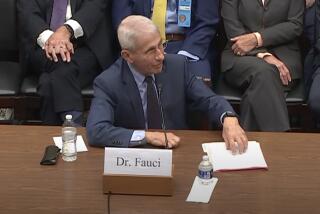Firm Probed on AIDS Drug Claim : Costa Mesa Maker of Ribavirin Cited in Congress Hearing
WASHINGTON — ICN Pharmaceuticals, a Costa Mesa-based drug company, may have misled federal officials and attempted to “hot wire the regulatory process” in promoting Ribavirin as a possible AIDS drug, according to testimony before a congressional investigating committee Thursday.
“What the evidence indicates is that the company hasn’t told the Food and Drug Administration the truth, the company hasn’t told the Securities and Exchange Commission the truth, and most importantly, the company hasn’t told the suffering patients the truth,” Rep. Ron Wyden (D-Ore.) said in an interview Thursday.
Company officials did not testify at the hearing, but will be given an opportunity to do so next month, according to Rep. John D. Dingell (D-Mich.), chairman of the investigations subcommittee of the House Energy and Commerce Committee, which conducted the hearing. Wyden was the principal questioner at the hearing.
In a statement released Thursday in Costa Mesa, ICN said that “because of the sensitivity that surrounds the development of any drug with the potential of activity against AIDS, ICN henceforth will make no public announcement about the status of Ribavirin until the Food and Drug Administration has completed its review.”
A source close to the company said, however, that, “In our view the drug works. There is ample evidence that this drug works against many viruses.”
“We are caught in a political arena,” the source said, “the company doesn’t know what to do.”
Ribavirin was approved by the FDA in 1985 for treatment of a childhood respiratory disease. Company officials announced in January, 1987, however, that tests of the drug, marketed as Virazole, indicated that it may slow the onset of AIDS in people who had been infected with the AIDS virus but have not yet come down with the disease.
After that announcement, the company’s stock rose substantially. But the FDA questioned the test results. According to FDA commissioner Frank E. Young, who testified Thursday, those claims did not hold up.
In April, the agency refused to allow ICN and its subsidiary, Viratek, to expand tests of the drug for AIDS patients, causing the company’s stock to drop.
At the hearing, Dr. Bernard Bihari, director of the Kings County Addictive Disease Hospital in New York City, testified that ICN in January, 1986, had offered to provide Ribavirin to him to give to AIDS patients. When he told the company that he was interested only in clinical tests of the drug, not in selling it to patients, company officials told him that they were not interested in tests and asked for the names of other doctors with AIDS patients, he testified.
Investigation Under Way
Subcommittee documents indicate that ICN established a “clinical research grant program” which provided Ribavirin to doctors for AIDS patients. Congressional investigators and the FDA are looking at whether that program may have been used to promote the drug before it received approval by the FDA. Under federal drug laws, efforts to promote the sale of a new drug for an unapproved purpose are illegal.
Bihari also testified that ICN officials said they would offer his patients the drug “at cost”--$360 for a month’s supply--at a time when the drug was available legally in Mexico for $120 per month. Bihari called the company’s efforts “sleazy and illegal.”
The FDA is conducting “various investigations” of ICN activities relating to Ribavirin, Young told the subcommittee.
The agency will continue to receive information from the company about the drug’s utility, Young said. In addition, however, the FDA is examining whether the tests on which the company based its January announcement were deliberately biased to make the drug look more effective than it is.
An Open Question
In answer to a question by Rep. Wyden, Young said the FDA was not prepared to say that the tests were biased, but that the agency considers the matter an open question. Deliberate submission of misleading test results to the FDA in a drug application would be a violation of federal law.
But Dr. Peter Heseline, associate professor of medicine at USC, who conducted the tests there, said, “I think the results show that the drug is promising.”
The subcommittee is also investigating a disclosure statement that ICN submitted to the Securities and Exchange Commission early this year about the AIDS-fighting potential of Ribavirin. At the hearing, Young said that several of the statements in the documents given to the SEC were not true.
“If in fact the company did not make truthful assertions to the SEC,” Wyden said, “it is a serious matter.”
Deliberate misstatements to the SEC of material facts are a violation of federal securities fraud laws. Wyden said he does not know whether the SEC is investigating ICN’s actions. Several SEC staff members, however, were present at the hearing.
Times staff writer Carla Lazzareschi in Orange County contributed to this story.
More to Read
Sign up for Essential California
The most important California stories and recommendations in your inbox every morning.
You may occasionally receive promotional content from the Los Angeles Times.











